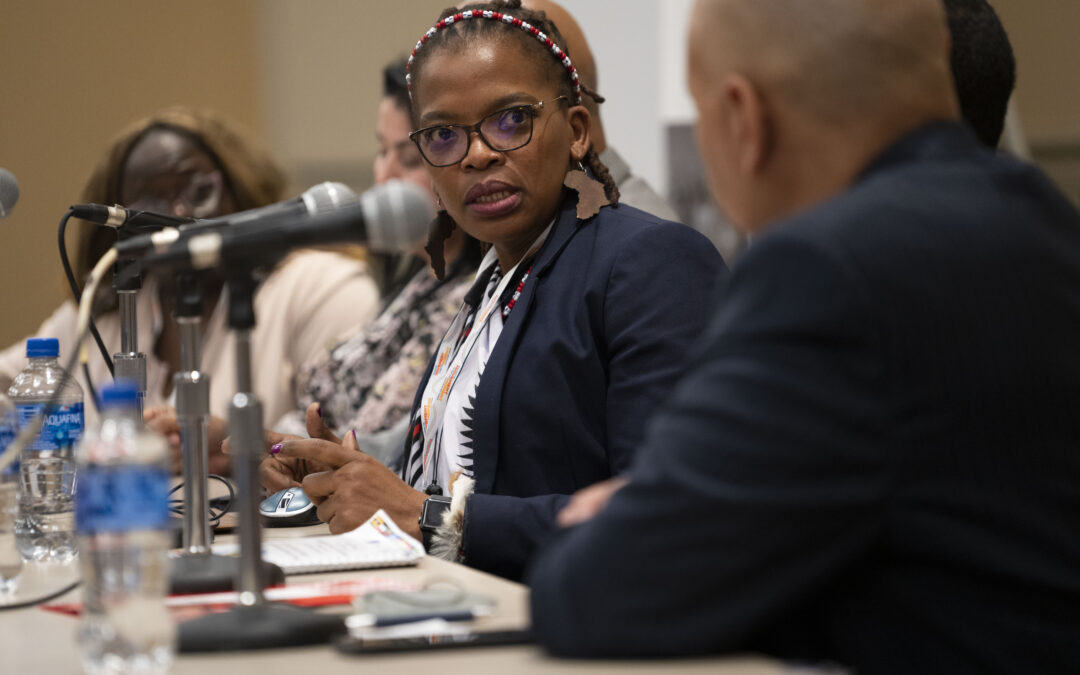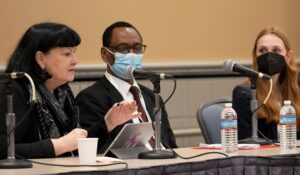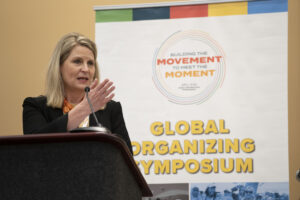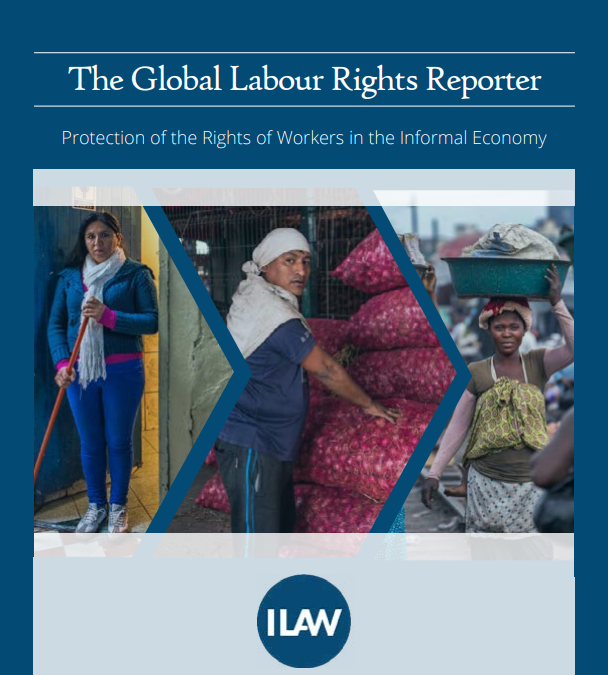
Jun 17, 2022
The Global Organizing Symposium, a daylong side event of the AFL-CIO Convention, brought together workers and activists from around the world to share experiences focused on building collective power for workers post-pandemic and highlighted their role in fighting authoritarianism and bolstering democracy. Sessions focused on platform worker rights, clean-energy models that both address climate change and work for workers and building an inclusive movement for gender and racial equality.
In the first session, panelists shared how gig workers in the platform economy are organizing globally to create decent work in a sector notorious for low-balling pay and denying rights and benefits.
As the pandemic took hold two years ago, app-based delivery workers in Mexico—like their counterparts around the world—encountered increasingly dangerous working conditions. When one worker was killed on the job and the company did nothing, they knew the only way to protect themselves and their livelihoods was to join in common cause.
The workers formed a colectivo they called Ni Un Repartidor Menos (Not One Delivery Worker Less) to address egregious and life-threatening job hazards, among them sexual harassment, violence, injuries fatal and less so, as well as unfair laws that have levied onerous taxes on wages and for the use of infrastructure, like sidewalks.
Saúl Gómez, founder of Ni Un Repartidor Menos, told a gathering of almost 300 union activists convened ahead of the AFL-CIO Convention for the Global Organizing Symposium last weekend that the app company cares little about the workers, and customers can act with impunity toward delivery people. Women workers, in particular, face inappropriate behavior and additional safety risks. For example, Gómez said it was not unusual for naked customers to receive deliveries. Even worse: One woman worker delivering to a residence in one of Mexico City’s toniest neighborhoods, Polanco, was held captive by the customer for nearly a week.
The customer suffered no consequences. The worker was fired when the company removed her from the app.
Defending Democracy and Hard-Won Rights

ITUC General Secretary Sharan Burrow discusses the erosion of democracy with Kassahun Follo Amenu from Ethiopia and Olesia Briazgunova from Ukraine. Credit: Jay Mallin
Speakers pointed to the erosion of democracy in their country and ways the labor movement is working to turn the tide. Nowhere is the conflict between authoritarianism and freedom more in the spotlight than Ukraine.
“We are paying a big price for independence,” said Olesia Briazgunova, international director of the Confederation of Free Trade Unions of Ukraine. Among the thousands of Ukrainians defending their country are union members, while other unionists are “dodging bullets and shelling to deliver humanitarian aid.
“At the same time, we are following situations in other countries like Myanmar, Belarus and Hong Kong, and every threat that spreads evil in the world.”
Tunisia, meanwhile, is going through an economic, financial, social and institutional crisis, and “conditions are deteriorating with the inability of the elite to develop democratic institutions,” said Hedia Arfaoui, deputy secretary general of the Tunisian General Labor Union (UGTT). Youth are especially disillusioned, she added, with little hope for employment or a reduction in the poverty rate.
Many Tunisians are concerned that the democracy gains made following the 2011 revolution—especially those made by women, including full gender equality under a new constitution—will be dismantled. Tunisian President Kais Saied, who is currently ruling by decree, has said he will replace the 2014 constitution. Hundreds of thousands of UGTT members took part in a general strike June 16.
“Women’s rights are an integral part of the human rights system. And Tunisian women and trade unionists are aware of the danger of rollbacks of all they have won,” she said.
In Ethiopia, where politics are based on ethnic groups and a divisive war continues, the Confederation of Ethiopian Trade Unions (CETU) promotes inclusion, peace and dialogue, said CETU President Kassahun Follo. As the largest multi-ethnic, civil society organization in the country, the union focuses on common goals, “uniting on workplace issues and labor rights,” he said. Since October 2021, CETU has organized 30,000 workers.
“There are no human rights, no labor rights without democracy. And today, fewer than 20 percent of people live in truly free countries,” highlighted Sharan Burrow, general secretary of the International Trade Union Confederation. “We can only ensure peace and democracy through social justice.”
Participants also expressed concern over the situation in Hong Kong and pledged support to working people and unions in Hong Kong who are under severe pressure.
Workers, Unions and Climate Change

AFL-CIO President Liz Shuler engaged with participants at the AFL-CIO global side event. Credit: Jay Mallin
Lebogang Mulaisi, labor market policy coordinator of the Congress of South African Trade Unions (COSATU), said that very early on, COSATU recognized that “climate issues are workers’ issues,” and COSATU’s work to bring about a just transition is based on three principles: distributed justice, procedural justice and restorative justice. The first ensures the benefits and burdens of what is a very disruptive process be distributed. Procedural justice means everyone affected is involved in determining the rules that guide the transition. And with restorative justice, vulnerable populations most affected by unemployment and inequality—among them women and youth—are both participants and beneficiaries.
“It will take strong unions to bring about a just transition,” she said.
In Brazil, efforts to move toward the use of renewable energy are a challenge not least because democracy there is under threat, said Quintino Severo, deputy international affairs secretary of CUT Brazil. “A great challenge is to make sure all the rights we have won are respected,” he said. “Clean energy isn’t clean if it’s tainted by the blood of workers.”
Highlights of the event included keynote speeches by Liz Shuler, AFL-CIO president, and Uzra Zeya, U.S. under secretary for civilian security, democracy and human rights.
Cathy Feingold, AFL-CIO international director, moderated the symposium. Other speakers discussing organizing and democracy in the U.S. and European contexts were: Stuart Applebaum, president of the Retail, Wholesale and Department Store Union (RWDSU); Roxanne Brown, international vice president, United Steelworkers; Stephen Cotton, general secretary, International Transport Workers Federation; Atle Høie, general secretary, IndustriALL; Zingiswa Losi, president, COSATU; Biju Mathew, president, International Alliance of App-Based Transport Workers, Terrence Melvin, secretary-treasurer, New York State AFL-CIO; and Ashwini Sukthankar, director of global campaigns, Unite HERE.

Mar 14, 2022
Workers in the informal economy, with assistance from legal advocates, have won protections and respect for their rights at work through a variety of legal strategies, both within and outside of labor law.
In the latest issue of the Global Labour Rights Reporter, case studies highlight the ways workers and their advocates have been fighting to ensure protections on the job in the informal sector, and the complications that arise from these efforts.
The journal, a project of the Solidarity Center’s International Lawyers Assisting Workers (ILAW) Network, is a forum for labor and employment law practitioners who grapple with the legal and practical issues that directly affect workers and their organizations. Articles feature migrant domestic workers in the Gulf, waste pickers in Colombia, digital platform workers in Brazil, agricultural workers in Jordan and street vendors and transport workers globally. There, unions and other worker representative organizations are developing laws and policies to ensure informal workers receive the same social protections that formal workers enjoy.
The International Labor Organization estimates that 61 percent of the world’s workers are in the informal economy—approximately 2 billion workers worldwide. They have been consistently excluded from legal recognition and protection, often due to deliberate policy choices driven by discrimination based on race, caste, sex, gender, ability, age, migration status and more. The number of informal workers has only increased during the COVID-19 pandemic as businesses closed and governments fell short in creating policies that fostered formal job creation.
“[Is] labor law the only solution to informality? The answer is no, though this does not mean that labor law concepts cannot be helpful in shaping solutions,” according to Jeffrey Vogt, Solidarity Center’s director of rule of law and chair of the ILAW Network, and Marlese von Broembsen, law program director for Women in Informal Employment: Globalizing and Organizing (WIEGO), in the journal’s opening note. Advocating for coverage by labor law might be an effective strategy where workers in the informal economy are rendering a personal service for another. However, in cases where there is no notional employer, workers have adopted other strategies, including to negotiate agreements with municipal authorities to be afforded certain rights and/or be included in protection schemes, or engage in constitutional or human rights litigation.
Previous issues of the journal focused on access to labor justice and accountability and remedy in global supply chains. All issues are available in English, French and Spanish.

Mar 11, 2022
A number of Ukrainian trade unions, including the national union of nuclear plant workers, have donated portions of their salaries to Ukrainian aid and defense charities. In the first 10 days of the war, these trade union salary donations amounted to nearly $500,000.
One of the largest private-sector unions in Ukraine, the trade union of Nova Poshta (a shipping and logistics firm with operations also in Europe and the United States), conducted national and international fundraising to support its members displaced and in need, as well as the families of volunteers for Ukraine’s Territorial Defense Forces. In the first week of the war, the Nova Poshta trade union collected 795,000 hryvnia (about $27,000) for member assistance. In the first few days of outreach, 118 internally displaced people and refugees received aid, as did 45 families of members who were mobilized. The union expects this aid effort to grow quickly in the weeks ahead.
The Nova Poshta union, founded in 2015, signed its first collective bargaining agreement in 2016. Its pre-war membership was approximately 14,000 workers, and the collective agreement covers 27,000 employees.
The union’s work is in addition to that of the company, which is delivering humanitarian assistance from around the world to locations where it is needed most in Ukraine.
Although the Nova Poshta union is particularly active in solidarity support, many others are also assisting members during this crisis. These include fundraising and mutual aid efforts by the Union of Metal and Mining Workers, which has contributed over $35,000 to support families of mobilized soldiers.
Here’s How You Can Help
You can help Ukraine’s workers and their families by donating to the ITUC’s emergency fundraising appeal. The ITUC’s Ukrainian member organizations, FPU and KVPU, are providing support to families who desperately need assistance with food and water, medical supplies and hygiene items. Donate here.
You can also support these organizations also providing emergency assistance to people under bombardment or seeking refuge from the war:

Mar 4, 2022
Statement by the NED Family: The National Endowment for Democracy, the National Democratic Institute, the International Republican Institute, the Center for International Private Enterprise, and the Solidarity Center:
Vladimir Putin’s illegal and unjustified attack on a sovereign, free Ukraine is a watershed moment in the struggle for human freedom. To meet this moment, we are determined to support democracy activists on the frontline with the same sense of urgency they bring to their own national struggle. The National Endowment for Democracy (NED) and its four core partners—the National Democratic Institute (NDI), the International Republican Institute (IRI), the Center for International Private Enterprise (CIPE) and the Solidarity Center—stand in support and solidarity with our Ukrainian grantees, partners, staff, and their loved ones in Ukraine.
Since gaining independence in 1991, the people of Ukraine have time and again demonstrated their overwhelming desire to live in a free and democratic nation. We have been inspired as millions of Ukrainians have worked tirelessly and optimistically to build democratic institutions and practices in their country. Ukraine’s progress and commitment to this goal is what threatens and provokes Vladimir Putin. A democratic example on Russia’s border and a people with a shared culture and history who choose their own leaders, hold them accountable, and display a clear desire to join the community of democratic nations, represent an existential threat to Putin’s more than two-decade rule in Moscow and his ambition to dominate Russia’s neighbors.
Ukraine today is the epicenter of the fight for freedom in the world. The courage of the Ukrainian people—their willingness to risk everything to confront Russian aggression and defend their homeland—is an inspiration. They are a powerful example to all those worldwide who are joined in the struggle against authoritarian regimes that deprive free peoples of their basic rights and liberties, steal national wealth, attack and imprison political opponents, and silence independent media.
So too are the thousands of Russians and Belarusians who have risked arrest or worse to protest this criminal act of aggression. On Sunday, February 27, 2022, more than 10,000 people visited the memorial near the Kremlin marking the spot where Putin’s democratic rival, Boris Nemtsov, was assassinated seven years earlier. This is what Putin, and all dictators fear—ordinary citizens who would like to choose their leaders in free and fair elections and hold those leaders to account.
As the Ukrainian people struggle to preserve their sovereignty, their democracy, and their hopeful future, it is time for all those worldwide who live in freedom to rally to the cause of a free Ukraine.
Putin’s attack on Ukraine comes at a moment when democratic institutions are being systematically undermined across the globe and authoritarian regimes are growing in number and strength. Alert to a great danger, democratic societies should make every effort to secure the freedoms we cherish, the institutions we have built, and the values we have affirmed, to promote a more secure, just, and peaceful world.
Ukraine’s defense should become the valiant first chapter of a global democratic revival. In this task, we are committed to supporting a great coalition of courageous and creative political leaders, civic activists, independent journalists, labor organizers, entrepreneurs, and ordinary citizens who will lead the way.
MEDIA CONTACTS:
NED: Christine Bednarz, christineb@ned.org, (202) 200-6872
NDI: Victoria Benner, media@ndi.org, (202) 728-5550
IRI: Ryan Mahoney, rmahoney@iri.org, (202) 914-1617
CIPE: Pam Kelley Lauder, pkelleylauder@cipe.org, 202-721-9200
SOLIDARITY CENTER: Kate Conradt, kconradt@solidaritycenter.org. 202-316-3301

Jun 23, 2021
LGBTQ workers in Southeastern Europe face daunting barriers to attaining equality and safety on the job, among them exclusion, discrimination in obtaining employment, harassment and violence on the job, and poverty.
In the region, two-thirds of workers who identify as LGBTQ hide their identity due to fear of losing their job, fear of alienation and discrimination from other colleagues, fear of violence and fear of exploitation, according to research by LGBTQ Equal Rights Association for Western Balkans and Turkey (ERA), an umbrella organization for more than 60 LGBTQ groups in the region. ERA also reports that 16 percent of workers surveyed have experienced unfair treatment with respect to employment conditions, and 41 percent of workers have witnessed negative conduct toward their colleagues who identify as LGBTQ.
“This is where unions come in. These are workers who are being harassed simply for showing up and doing their job. That is definitely a trade union issue,” says Steven McCloud, country program director for Albania, Bosnia and Herzegovina, Montenegro and Serbia.
This year, the Solidarity Center launched a program with Southeast Europe regional trade union network Solidarnost, participating unions in Albania, Bosnia and Herzegovina, Montenegro and Serbia, and Pride at Work, which represents LGBTQ union members in the United States, to take on LGBTQ worker issues and build solidarity by addressing LGBTQ discrimination and harassment at work as part of larger efforts tied to improving occupational safety and health and eradicating gender-based violence and harassment on the job. The program focuses on the intersection of LGBTQ rights with workers’ rights to safe and healthy workplaces free from violence and harassment.
Countries in Southeastern Europe have some laws that protect LGBTQ people from basic discrimination. However, the struggle often lies in creating a safe space where LGBTQ workers who experience discrimination can come forward, exercise their rights and be supported, McCloud says.
“This can be done through promoting practices that strengthen their visibility, representation and capacity in trade unions in those countries,” says McCloud. “LGBTQ rights are worker rights, and unions need to ensure that LGBTQ workers are meaningfully included and represented.”







